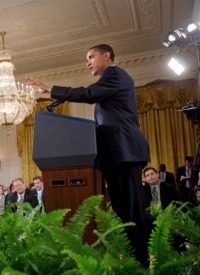
President Obama has famously issued a deadline to Congress to pass a healthcare package before the August recess. And those bold marching orders are causing even the press to wonder if it’s the president’s role to tell Congress what laws to pass, and perhaps that the president is assaulting the constitutional separation of powers.
During Obama’s July 22 press conference, one reporter asked the president: “Is it your job to get a deal done?” Obama replied without hesitation, “Absolutely it’s my job. I’m the president. And I think this has to get done." Obama also noted, “If you don’t set deadlines in this town, things don’t happen.”
The problem with Obama’s statement is that the U.S. Constitution clearly states that “all” lawmaking powers reside in Congress, and the Constitution gives the president no power to issue orders to Congress. Article I, Section 1 of the U.S. Constitution reads: “All legislative powers herein granted shall be vested in a Congress of the United States.” If all lawmaking powers reside in a Congress, then there are none left for the president to issue orders to demand legislation.
Article II, Section 3 of the Constitution does give the president the power to make recommendations: “He shall from time to time give to the Congress information of the State of the Union, and recommend to their consideration such measures as he shall judge necessary and expedient.” But the Constitution nowhere empowers the president to issue marching orders on legislation to Congress.
While the constitutional role of the Congress is to make the laws, the role of the president under the Constitution is to “take care that the laws be faithfully executed.” (Article II, Section 3) In other words, under our constitutional system, Congress makes the rules and the deadlines, and the president is responsible for following the orders of Congress. The president can’t set deadlines or make the rules. Constitutionally speaking, the president is little more than the errand-boy of Congress.
President Obama has clearly inverted the constitutional system with his issuance of a deadline on health care legislation, and his marching orders to Congress constitute an attack on the Constitution’s separation of powers.



